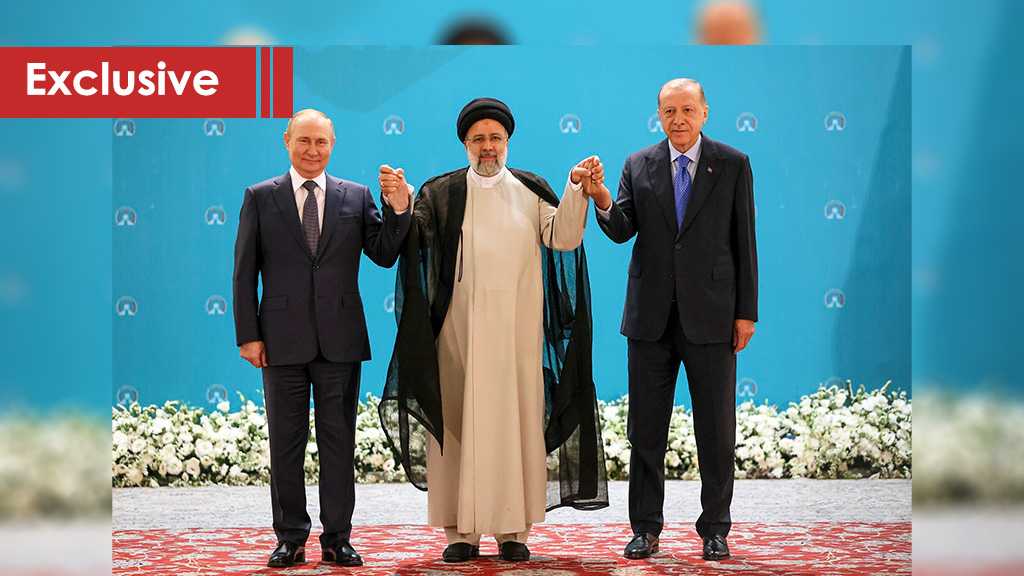
The Tehran Summit & The Vanishing West

By Darko Lazar
An atmosphere of cordial consensus dominated this week’s Tehran summit that brought together the leaders of Iran, Russia and Turkey, and which at least one Turkish portal described as “historic”.
Throughout the many hours of intense diplomacy, the summit took on both bilateral and trilateral dimensions, covering everything from the complex situations in Syria, Ukraine and Afghanistan to cooperation in the fields of energy, industry and transportation.
Mainstream media outlets were quick to dismiss the meetings as insignificant, even as they eagerly highlighted fissures over Syria. But the Tehran summit marks another major blow to American foreign-policy interests, while exposing Washington’s shrinking sphere of influence in the Middle East and beyond.
According to prominent Iranian academic and political analyst, Dr. Mohammad Marandi, this was “a very important summit.”
“It showed that neither Iran nor Russia are isolated, and it created an opportunity for Iran and Russia to expand bilateral ties,” Dr. Marandi told al-Ahed News.
A professor of Orientalism at the University of Tehran, Dr. Marandi is convinced that this bilateral relationship is experiencing “a rapid shift.”
He points to a number of key factors, including the cementing of the International North-South Transport Corridor [INSTC] – a massive 7,200-kilometer network of ship, rail and road routes that form a sanctions-proof passageway for moving freight between Russia, Iran, India and surrounding countries.
Dr. Marandi explains that this emerging logistics hub “will give Iran access to Europe and Russia, and Russia access to the Persian Gulf and the Indian Ocean.”
Furthermore, the Tehran summit was the setting for the signing of the biggest strategic investment deal between Iran and Russia in the oil sector. The initial USD 4 billion contract, which will see Russian companies develop seven Iranian oil fields, has the potential to grow to USD 40 billion and expand to related projects.
“This will empower Iran significantly and it will empower the Russian investors as well,” Dr. Marandi said. “This expansion of bilateral ties leaves the Europeans out in the cold from the Iranian and Russian markets, and it makes them increasingly irrelevant to Iranian and Russian trade routes.”
When it comes to irrelevance, few names are more pertinent than Joe Biden. The American president was in “Israel” and Saudi Arabia in the days leading up to the Tehran summit, where he tried to offer reassurances of US might and regional influence.
A few fist bumps later, he managed to do the complete opposite, before returning home without advancing the normalization of ties between Riyadh and Tel Aviv, as well as failing to convince Gulf monarchies to increase oil supplies intended to help slash Russia’s record earnings and relieve some of the West’s own price pinch at the pump.
“In contrast to Biden’s regional trip, which appears to be a flop, this [Tehran] summit went very well,” Dr. Marandi added, pointing to successes in both bilateral and trilateral discussions.
The status quo
Syria was the stated focus of the meetings in the Iranian capital, which hosted the heads of the ‘Astana Process’ guarantor states. The talks were initiated in 2017 with the aim of establishing a lasting peaceful settlement in the Syrian Arab Republic.
Since then, Syria has remained a place where the policies of all three countries intersect. But unlike Russia and Iran, Turkey’s definition of ‘terrorists’ does not apply to al-Qaeda factions in Syria’s occupied Idlib province.
Instead, Ankara wants to launch another military incursion into northern Syria, its fifth since 2016, to go after the US-backed Kurdish separatists. Shooting Kurds is a popular sport in Turkey, and it may be especially useful to Ankara at a time of soaring inflation and the prospects of a tough reelection campaign for President Recep Tayyip Erdogan.
Leader of the Islamic Revolution His eminence Imam Sayyed Ali Khamenei warned Erdogan against a further invasion, stating that “a military incursion in Syria will benefit terrorists”. But after the summit, Russia’s Vladimir Putin said that disagreements with Ankara persist over Syria.
The fallout from another Turkish military operation is hard to predict but there is room for compromise. For starters, Iran, Russia and Turkey all agree that the biggest problem in Syria is the American military presence and US proxies.
This isn’t likely to translate into a direct military confrontation with US forces, but ongoing dialogue between the Astana Process guarantors has completely sidelined Washington, with the Americans no longer able to exert any real influence in the region. It’s also telling that Erdogan is discussing his potential military operation with Tehran and Moscow without any involvement from the US.
Also noteworthy is the fact that these three powers are currently not interested in fundamentally changing the situation in Syria and are likely to work toward maintaining the status quo.
There is one other player in the Syrian arena that was watching the strengthening Russia-Iran alliance with a great deal of concern.
The chairman of “Israel’s” so-called Foreign Affairs and Defense Committee in the Knesset, Ram Ben-Barak, articulated those concerns, warning that “cooperation between Russia and Iran […] can spell troubling results in many regards.”
As a matter of fact, Tel Aviv’s relationship with the Kremlin has deteriorated significantly in recent months over “Israel’s” support for Ukraine and its intensifying strikes on Syria.
Russia is even moving ahead with plans to close the highly influential Jewish Agency for “Israel”, which poses as an NGO but coordinates its work with the “Israeli” government, facilitating the migration of people from different parts of the globe to occupied Palestine.
Dr. Marandi believes that the Tehran summit “sends a message to the Western camp that their attempts to marginalize their adversaries have failed, and ‘Israel’, being a small part of the Western camp, will have to accept that their benefactors are losing this war.”



